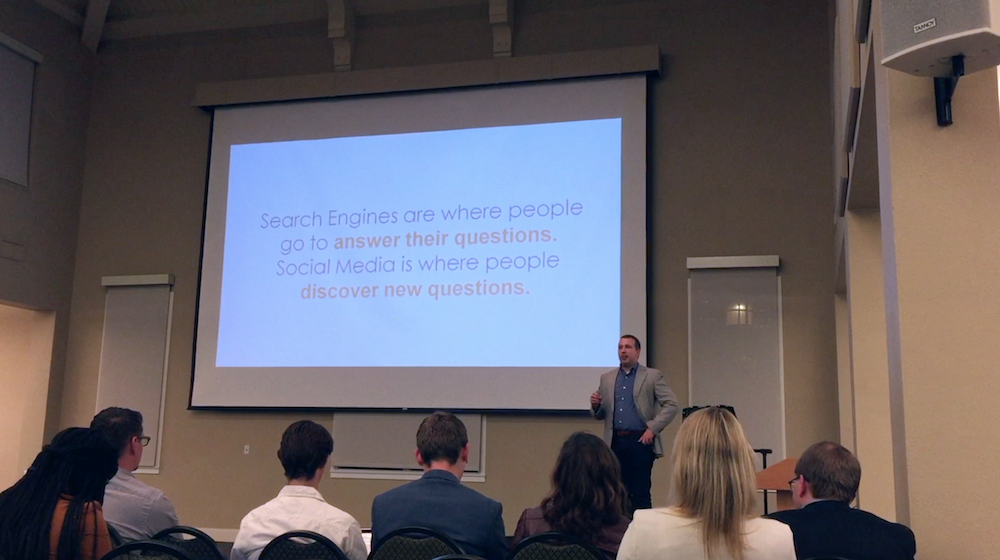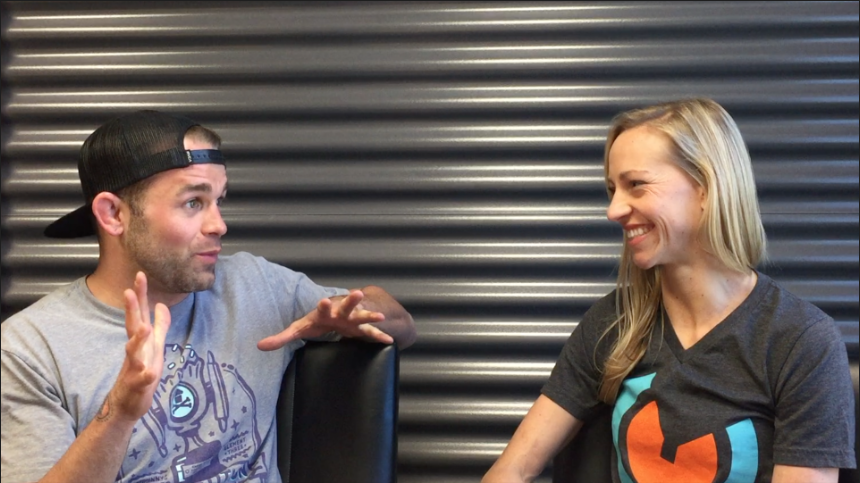What's Trending in B2B Demand Gen, Sales and ABM courtesy of B2BMX
Our market researcher, Tammy Duggan-Herd, attended the 3-day B2B Marketing Exchange Conference in Scottsdale, Arizona! So we thought we’d put...
I know what I am looking for, and would like to chat.
A team of data-driven marketers obsessed with generating revenue for our clients.
Because the proof is in the pudding.
At Campaign Creators we live by three principles: Autonomy, Mastery, Purpose.
4 min read
 Campaign Creators
:
3/2/17 2:42 PM
Campaign Creators
:
3/2/17 2:42 PM

What does the future of social media look like? Watch to hear CMO of HubSpot, Kipp Bodnar's predictions for what lies ahead for social media, search, messaging and marketing.
I think the challenge of videos that you could get paralyzed by, is feeling like it has to be so awesome and you need this perfect equipment, and that's just not true. What actually is important is that you understand the stories that are relevant to your audience and that you have some way to deliver that to them in a short, mobile-friendly video format.
Social is going to be the way we find the questions, right? I think this is a very important notion. Search is really valuable when you know the question to ask. Social media is where you find new questions to ask. I think those are the two differences there in how people discover information, and I think we've gotten really good at asking the questions we know. We're going to get really good in the future about discovering the questions we should be asking. I think that's awesome.
Engagement has never been more important, right? In a world of search engines, links were the currency, links were the popularity contest. Like, sweet, all these people, all these cool people linked to this thing, this thing must be legit. Well, in a world of social, it's that engagement. We found out on Medium, for example, the big thing is recommend. If you hit the recommend button on Medium, getting recommends and giving them in a high velocity is what actually helps you be discovered in the Medium feed is what we've learned from our experimentation. That really underscores that, wow, we've moved from a web where currency is links to a place where currency is really engagement. I think that underlines what a lot of folks here has talked about. I think, I go back to the early days of social media, people used engagement as this very fluffy term. Engagement is now the mechanism that enables your content to be discovered online. That's how I would think about it if I was all you.
The other reasons messaging is so exciting, if you're not a marketing geek like me, you might have been unaware that early this year Facebook launched, basically, an app store for Messenger so you could build chat bots, essentially, within Messenger. That's basically that example I showed you from us earlier, that's what we did. We built a chat bot within Messenger to interact, to recommend content to people who were trying to learn more about marketing or sales. Think about that, you could have live, real-time, automated interactions in a way that's not ever possible with email, in a way that people simply wouldn't do with email. You can do that on a messaging platform with Messenger, Slack, WhatsApp.
It's interesting, between Messenger and WhatsApp, Facebook is doing 60 billion messages a day. That overshadows most other interaction numbers that you see. That is a massive amount of interaction. The interesting thing is you know what that number doesn't include? It doesn't include WeChat, which is the biggest fricking messaging platform in the world. Just because we're in America, we don't use it, but China, WeChat is how everybody communicates. It's how everybody does business throughout China and the greater part of Asia.
The reason why messaging as a platform is so interesting is because we go back to that idea of five apps. People don't want a big bunch of apps they use, and so when I think about platforms, I would argue that we now have three great platforms. First great platform was the desktop operating system. It gave us the Mac and Windows OS, ushered in a whole wave of innovation, allowed us to do a bunch of crazy awesome things, build really cool desktop applications, be much more productive at our job. The next great operating system was the web, you could build web apps. Then, the third one was iOS and Android, the mobile operating system that allowed you to build app infrastructure there. I would posit to you that messaging applications, Facebook Messenger, Slack, those are the next great operating systems because you can operate many app's bots within those networks in the same way you would on iOS or on the web, and that will be the next great platform that we all interact with.
Social media data has never been more important, and it's also never been harder to get. As you think about whatever your strategy may be, whatever platform, you have to first think about what data's important to you and how are you going to get it? This is very simple, right? How are you going to know if you're successful or not? In some cases, it's very hard to get. Just like anything else, it will become easier to get over time, but in some of the stuff, like the messaging space, the data's very tough to get right now. When you think about on the work that you're going to do, I think historically we've looked at Google Analytics, HubSpot Analytics, different analytic tools to be our source of truth on how we're doing at building awareness and getting people to interact with a brand convert into leads and customers. Well, you need to now append that with the interactions that are happening off of your site, the interactions that are happening on social platforms, whatever that may be for your particular industry.
You've got to build a strategy that incorporates video and messaging in the future. I'll be around after this having a beer, but there's some really interesting messaging bot apps. You can use something like, there's an app called Flow XOwhere you can basically automate a bot within Facebook Messenger or Slack if you want to have a really cool interaction. You can set up, basically, cool automation rules around that. There's some really interesting stuff that's coming, happy to talk more about that with folks in a smaller group because that's a whole nother presentation for another day.
On the video side, I think the challenge of videos that you could get paralyzed by, feeling like it has to be so awesome and you need this perfect equipment, and that's just not true. What actually is important is that you understand the stories that are relevant to your audience and that you have some way to deliver that to them in a short, mobile-friendly video format, and the social networks help you deliver that. That's my advice to you. I'm not going to keep you any longer because we're going to go have beers outside, and that's going to be amazing because I live in Boston and it's, like, 20 degrees right now, so I cannot think of anything better than having a beer outside. Thanks, everybody.
Do you agree with Kipp's predictions for the future of social and search? Let us know your thought by commenting below.
Want to generate quality leads? Create a lead generation educational campaign today with your free guide: Introduction to Lead Generation with a bonus Campaign Checklist.
This blog post is part of “Your Definitive Guide to Lead Generation” blog series.

Our market researcher, Tammy Duggan-Herd, attended the 3-day B2B Marketing Exchange Conference in Scottsdale, Arizona! So we thought we’d put...

A content pillar is a broad piece of website content that's comprised of and connected to a series of owned media topic clusters that cover a...

Luke Summerfield, Program Manager and GDD guru at HubSpot, shared with Campaign Creators how to apply Growth-Driven Design tactics to your campaign...